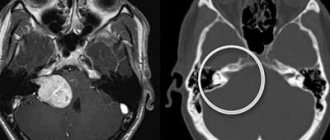The genital form is manifested by anatomical and histological underdevelopment of the genital organs, while ovarian function is reduced. However, in this case there are also signs of general infantilism. Developmental deviations, as a rule, begin in adolescence, but the disease itself in males is usually diagnosed at 15 years of age. In women, this pathology is often discovered by chance, most often during infertility or miscarriages.
Causes
A lack of hormones can appear as a result of pathology of the endocrine organs (pituitary gland, gonads, thyroid gland), but is more often caused by a violation of the hypothalamic regulation of endocrine functions. In addition, the causes of infantilism are associated with chronic intoxication, abnormalities in the functioning of endocrine organs, chronic diseases, hypovitaminosis in childhood or adolescence. In women, the disease can occur as a result of delayed ovarian development and insufficient function. Illnesses suffered in childhood, even if they are not too severe, can leave a negative mark on the development of a girl’s body.
In addition, the pathological course of pregnancy in the expectant mother, as well as extragenital diseases, contribute to the development of the disease in the child. Therefore, it is necessary to exclude the negative impact of all kinds of unfavorable factors on the fetus in the first months of intrauterine development.
Infantilism
Infantilism, first of all, is a delay in the development of the human body, which can be both physiological and psychological. There is general infantilism, which can be caused by various diseases suffered in childhood (tuberculosis, syphilis, various secondary infections), and partial infantilism, which most often carries a psychological problem. If we are talking about general infantilism, then its signs are the persistence of small child body, absent and mild secondary sexual characteristics, small heart and low blood pressure. Overall, it is a general delay in the development of the human body.
But there is also partial infantilism - a person develops like any other and does not have any physical disabilities, but at the mental level he remains a child. Such people are unbalanced, easily suggestible, and love to fantasize. The carelessness and ease of such people borders on egocentrism, childish egoism and exactingness. This type of infantilism is called mental.
Separately from the above types of similar diseases, sexual infantilism can also be noted. More often, this condition occurs in girls and is expressed by underdevelopment of the internal genital organs (uterus and ovaries), and therefore women often suffer from infertility or failure to carry a pregnancy to term. In boys, sexual infantilism is rare, but it does happen. It is also expressed in underdevelopment of the genital organs, lack of sexual desire, and problems related to the health of the prostate gland.
Causes of infantilism
There is no consensus on the causes of mental infantilism. Many believe that such behavior is just the result of improper upbringing, permissiveness and spoiling of the child.
However, it cannot be said that this is the only reason; several factors influence the occurrence of such behavior:
The desire of parents to completely control their child, and as a result, treating him like a little child, even when the child should be able to make decisions independently and be responsible for his own misdeeds.
It is also believed that one of the reasons may be severe psychological trauma that the child experienced in childhood or unfavorable living conditions from an emotional point of view (drinking parents, scandals at home, lack of contact with peers).
If we analyze all of the above, we can come to the conclusion that the infantilism inherent in adults takes its roots from childhood. Psychologists believe that infantilism develops in a child between the ages of 8 and 12 - it is during this period that the child must learn to be independent, make decisions, and complete what he has started. Contrary to this, many parents still tie their child’s shoelaces, try in every possible way to protect him from the slightest problems and encourage any action.
Male infantilism is very widespread. Such men are not able to take responsibility, make adult decisions, do not think about their future and do not think about the consequences of their actions. Therefore, raising boys requires special attention.
Treatment of infantilism
Modern medicine perfectly treats sexual and general infantilism. Of course, the earlier such a condition is diagnosed, the easier the treatment process will be.
As for infantilism in adults, serious work by a psychotherapist must be carried out here.
But as they say, it’s easier to warn, so all future parents should think about whether they are overprotective of their baby, and pay attention to whether he is too naive and demanding. Back to list
Clinical picture
Symptoms of infantilism in women often combine both a lack of development of the genital organs and a delay in the development of other systems in the body. Short stature and fragile build, with a narrow pelvis and thin skeletal bones - this is how the patient usually looks. At the same time, the mammary glands are not developed, female-type hair growth is weakly expressed. The function of the genital organs is also insufficient: there are menstrual irregularities, menstrual discharge is scanty, and is often accompanied by headache, nausea and vomiting. In advanced cases, there is no menstruation. Sexual desire is reduced or absent. In some patients, partial infantilism is observed, in which the patient has a normal physique, there are no mental abnormalities, but there is underdevelopment of the genital organs, and there is often a functional deficiency.
Men suffer from this disease much less frequently than representatives of the opposite sex. With this pathology in men, the appearance and sexual development do not correspond to their true age. Often secondary sexual characteristics are insufficient, the genitals are also underdeveloped, which causes patients many psychological problems. Characterized by a lack of sexual desire, spontaneous erections, and nocturnal ejaculation. However, it is worth noting that in some men the genital organs are formed without deviations; infantilism in this case is the result of mental underdevelopment. Such patients have difficulty communicating with women.
Mental infantilism
1.1. Intellectual deficiency in states of mental infantilism - immaturity of the individual with a predominant lag in the development of the emotional-volitional sphere and preservation of childish personality traits (Laseque E.-C., 1864). It is considered by most researchers as a consequence of impaired maturation of the youngest structures of the brain, mainly the systems of the frontal cortex and their connections.
The most likely causes of the development of mental infantilism are heredity, constitution, intrauterine intoxication and hypoxia, birth trauma, toxic-infectious effects in the first years of a child’s life, parenting defects (overprotection, despotism of parents). The prevalence of mental infantilism in the Russian Federation is 10% of children.
Simple (uncomplicated, harmonic) mental infantilism has been studied most thoroughly. At the same time, mental immaturity covers all areas of the child’s activity, including intellectual, but manifestations of emotional and volitional immaturity predominate: increased emotional liveliness, affective instability and rapid satiation of active attention, the predominance of the motive for receiving pleasure, excessive attachment to the mother, fear of everything new. Children are tireless in play, they are characterized by vividness of imagination, imagination, invention, and cheerfulness. However, intellectual interests themselves (inquisitiveness, curiosity) are poorly developed; gaming interests predominate even at school age. Children cannot independently organize their activities and subordinate them to the requirements of the school or team. All this ultimately leads to school immaturity, which becomes apparent in the first grades of school.
In the mental sphere, children with simple infantilism are dominated by concrete-active and visual-figurative forms of thinking, a tendency to imitative activities when performing intellectual tasks, insufficient focus of mental activity, and delayed formation of logical memory.
In contrast to oligophrenia, children with infantilism are characterized by general liveliness, spontaneity, increased interest in the environment, lack of inertia, stiffness of mental processes, they have a richer emotional life, stronger and differentiated attachments, the presence of a wider “zone of proximal development,” and increased suggestibility. The level of their abstract-logical thinking exceeds that of mentally retarded children. The intellectual defect itself is relatively shallow and is largely of a secondary nature, determined by a lag in personality development, that is, it is not mental retardation itself that occurs, but a delay in the rate of mental development (Sukhareva G.E., 1965; Pevzner M.S., 1966 ). The games of infantile children are characterized by activity, independence, elements of creativity, fantasy, and imagination. They have the ability to use help and transfer what they have learned to new material.
The somatic status often reveals signs of immaturity, growth retardation, gracile proportions, but there is no gross dysplasticity characteristic of mental retardation.
With age, manifestations of mental and physical infantilism can be smoothed out, sometimes disappear, and intellectual deficits can be compensated.
With complicated mental infantilism (CHI), in addition to mental immaturity, other pathological manifestations are noted.
The most difficult to differentiate is its first variant – organic infantilism. Patients are characterized by a lack of liveliness and cheerfulness; they are rather euphoric, complacent and disinhibited. Their games are poor, monotonous, devoid of imagination and fantasy, attachments are less deep and differentiated, thinking is more concrete (meaning underdevelopment of the ability to abstract), slow-moving. Individual dysplasias of organs and systems are more common.
The structure of intellectual impairments is of decisive importance in distinguishing from oligophrenia. With organic infantilism, insufficiency of the emotional-volitional sphere and violations of the so-called predominate. prerequisites for intelligence (attention, memory, rate of performance, endurance during mental activity). Actually, insufficiency of mental activity in the form of weakness in the processes of generalization and abstraction is not the main one in the clinical picture; mental operations in general proceed at a satisfactory level. The dynamics of organic infantilism are also more favorable, although a significant part of such children are transferred to a auxiliary school or to education in special conditions.
The cerebrasthenic variant of API, which is very common, is characterized by a combination of signs of childishness (less pronounced than with simple infantilism) with symptoms of irritable weakness (increased excitability, instability of attention, motor disinhibition, easy exhaustion, somatovegetative disorders). In addition, children are more timid, skittish, fearful, are not independent in an unfamiliar environment, and are prone to avoidant behavior.
The neuropathic variant of API, close to cerebrasthenic, is characterized by pronounced inhibited character traits (fearfulness, suggestibility, lack of independence, excessive attachment to the mother, difficulty adapting to children's institutions), disorders of autonomic regulation and a tendency in unfavorable conditions to consolidate asthenic personality traits, a high probability of developing asthenic psychopathy.
Endocrine variants of API are complicated by the addition of psychoendocrine disorders. Thus, with hypogenitalism, signs of infantilism are combined with lethargy, slowness, lack of concentration, and confusion. With pituitary subnanism, features of old age are revealed in the mental and physical appearance of the child, a tendency to teach, grumpiness, etc. The school failure of such children is a consequence of weak willpower, slowness, attention disorders, logical memory, and low development of the ability for abstract logical thinking.
Return to Contents
Complications of infantilism
- With infantility, the likelihood of conception is quite low. Often such women suffer from infertility or frequent spontaneous miscarriages. There is a high risk of developing an ectopic pregnancy. But, if you still manage to carry the baby to term, then labor is likely to be weak and bleeding is possible. In addition, women with this disease are at risk for developing malignant tumors in the genital organs.
- In men, the disease can manifest itself in weakened potency, the number of sperm in the semen is insufficient. Often patients with this diagnosis are infertile.
What does the development of infantility lead to?
It is not enough to understand the term of what infantilism is. To begin to understand this problem, you also need to know the basic manifestations of the problem. The most common of them is a reluctance to make important decisions and a fear of communicating with adults. Often such people try to shift important tasks to others, avoiding even such things as doing their own laundry or ironing things. Although it has been proven in practice that often such people earn money themselves and can have very good material wealth.
In many ways, representatives of this social category are selfish and pay more attention to their own problems and concerns. Unfortunately, it is almost impossible to get out of this state on your own.
Diagnostics
- When diagnosing infantilism, attention should be paid to anthropometric data. According to statistics, in 35% of patients, low indicators of physical development indicate a lack of sexual development.
- When performing functional diagnostic tests, an anovulatory cycle is detected. Gonadotropin excretion is increased, but sex steroid levels are decreased.
- The diagnosis can be made after an ultrasound, during which it is possible to determine the size of the uterus, the length of the cervix, etc. However, to plan treatment, it is necessary to perform a number of studies: x-ray hysterography, probing of the uterus, and, if necessary, laparoscopy
How to treat infantilism
The goal of therapy is to increase the sensitivity of the genital organs to the action of hormones, eliminate the cause of the pathology, as well as prescribe replacement therapy. However, before proceeding with the treatment of infantilism, it is necessary to exclude false hermaphroditism and the presence of a hormonally active ovarian tumor.
In women, infantilism is treated with hormonal therapy according to a specially developed regimen. Physiotherapy, special massage, and proper nutrition are also recommended.
In men, both drug therapy and surgical intervention are possible. To achieve the required concentration of testosterone in the body, hormone therapy is prescribed. It is possible either to introduce an artificial hormone or to activate the production of your own. If there are signs of mental infantilism, it is recommended to take antidepressants, antipsychotics, and tranquilizers. If conservative methods are ineffective, phalloplasty is indicated. During the operation, the patient's own tissue is used for penis plastic surgery.
How to overcome this disorder in yourself or your loved ones
After you have discovered the symptoms and all the signs of the described disorder, it is rational to contact specialized specialists. Modern techniques make it possible to develop a person’s sense of responsibility, accustom him to adult life, and socially adapt him to society.
For example, the Korsakov Clinic has been operating in Moscow for a long time, where they use new methods to restore mental health and social adaptation of citizens. In this way, you can help not only yourself, but also those close to you, to gain freedom of action and get rid of the handcuffs of your own immaturity.
We also recommend reading the article about prenatal depression.
Prevention of infantilism
Preventive measures should be aimed at preventing developmental disorders during the prenatal period. In addition, the possibility of infecting the child with infectious diseases should be minimized. Micropenis in boys should be a reason for parents to immediately seek help - treatment started on time will help avoid many negative emotions in the future. In addition, nutritious nutrition and adequate physical activity will certainly have a beneficial effect on the growing child’s body.
Specialist consultations
Endocrinology
| Name of service | Cost, rub. |
| Consultation with an endocrinologist | 2 300 |
Gynecology
| Name of service | Cost, rub. |
| Initial consultation with a gynecologist | 2 300 |
| Repeated consultation with a gynecologist | 1 900 |
| Initial appointment in uro-gynecology | 2 400 |
| Repeated appointment in uro-gynecology | 1 900 |
Andrology
| Name of service | Cost, rub. |
| Initial consultation with an andrologist | 2 900 |
| Repeated consultation with an andrologist | 2 200 |
Urology
| Name of service | Cost, rub. |
| Initial consultation with a urologist | 2 400 |
| Repeated consultation with a urologist | 1 900 |
Types of services provided
Gynecology
| Name of service | Cost, rub. |
| Hysteroscopy | 20 500 |
| Endometrial biopsy | 3 500 |
| Histological examination of the endometrium | 2 200 |
| Histological examination of the endocervix | 2 200 |
| Ultrasound gynecological expert | 2 800 |
Andrology
| Name of service | Cost, rub. |
| Spermogram | 1 990 |
| MAR test | 1 000 |
| Testicular biopsy | 20 000 |
| Nonspecific stimulation of spermatogenesis (1 procedure) - 1st complex | 1 500 |
| Nonspecific stimulation of spermatogenesis (1 procedure) - 2nd complex | 1 900 |
| Ultrasound urological expert | 2 500 |
Subscribe to news
Simplify your life - our newsletter will be useful to you.











